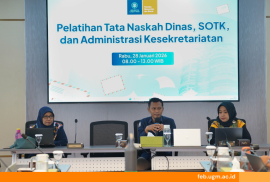Universitas Gadjah Mada’s Director of Student Affairs, Drs. Haryanto, M.Sc., calls upon all UGM academic community, especially students, to be more wary of scholarship offers using the name of the university or banking institution. The appeal was delivered to avoid more victims of fraud under the guise of scholarship to students via mobile phone short text messages.
Haryanto said that recently there were reports of complaints from three students who became victims of fraud. “We have been getting reports that there are three students who have become victims of fraud via short text messages or phonecalls. Each victim had transferred money to a certain account number, the amount of which were 2 million, 7 million, even 40 million rupiah,” he said on Thursday (10/11) at UGM.
Haryanto added, there are also complaints of fraud in form of seminar invitation. The sms and phonecalls are not only aimed at students, but also lecturers. “Recently, I received a report from Arie Sudjito (lecturer of Faculty of Political and Social Sciences) who claimed to have received seminar invitation through text messages,” he explained.
Besides text messages and phone calls, the fraud through scholarship offer is also done by sending a letter to Rector, Deans and lecturers. Another way commonly used is by sending a notice by e-mail. “The perpetrator who commits the fraud is very professional seen from the letters written on behalf of the Minister, Director General, Rector and Director of Student Affairs. The sms sent also accords with the full identity of students. This method is convincing enough, moreover with polite and orderly diction,” said the man who is familiarly called Sentot.
In this case, students or faculty members who respond to the offer are usually guided to send/transfer money to the account of the perpetrator. “The victim felt the need to comply with the perpetrator’s command. They just realized it after transferring the money to the bank, it seems hypnotism has been applied in this action,” Haryanto said.
How can the message sender obtain the data of their target? Haryanto said, the data are usually obtained by contacting lecturers, Faculties, and offices on behalf of the institutions which request the data. The similar method is also performed to the students. However, usually the perpetrators directly contact the heads of academic offices and request data, especially on scholarship recipients. “They said that they were from banking institutions, asking for more info about the target in order for them to be able to provide additional scholarships,” he said.
To anticipate any casualties, UGM tries to disseminate information of this fraud to all its academic community. Moreover, it also sends a letter to Yogyakarta Police Office to conduct hearings around the issues on campus. “We requested banking institutions to provide guidance to customers against increasing fraud and also to share this experience to Community of Vice Rectors for Student Affairs in Indonesia to avoid more victims,” said the man who serves as Coordinator of Indonesian Vice Rectors for Student Affairs Community.
On that occasion, Haryanto also explained about the mechanism of granting official scholarships from UGM. The notification ways are done through gateway sms, mail, and ugm.ac.id website. “After written notification, the scholarship recipients are advised to directly contact the UGM Directorate of Student Affairs, not other offices or individuals as stated in the text messages that are circulating,” he concluded.
Source: www.ugm.ac.id




